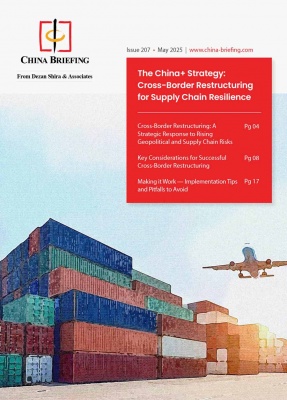Dezan Shira on China’s New Representative Office Regulations

By Sara Pinzon
BEIJING, May 16 – Dezan Shira & Associates, in conjunction with Servcorp, organized a seminar on May 12 in Beijing to discuss the new regulations for representative offices in China as the environment for ROs has changed since the beginning of the year.
Richard Hoffmann, Manager at Dezan Shira & Associates, and Sabrina Zhang, National Tax Partner of Dezan Shira & Associates, presented the seminar on the recent regulatory changes and how they affect existing ROs.
Recently, two new circulars have come into effect tightening the supervision of ROs in China, making it more difficult and time consuming to set up ROs and more difficult and costly to comply with the law. Some of the key changes are as follows:
- In order to set up an RO, the headquarters of the company needs to have existed for at least two years, and it has to be an offshore profit-making organization.
- The chief representative is now permitted to sign registration application documents, but the RO cannot have more than four representatives including the chief representative.
- New limitations are in place for representatives in an RO: the representative cannot have been convicted of a crime in China, and cannot have been a representative of another RO that in the past five years was canceled, had its registration certificate revoked, or was deregistered by authorities for being involved in illegal activities.
- Before, the operational term of an RO usually lasted three years, but now it may be able to last as long as the headquarter. Nonetheless, the registration certificate should be renewed on an annual basis to keep it valid.
- In terms of the media, public notice/announcement is required when a new RO is established or has gone through a change in registration, and when there is a deregistration or cancellation of the registration certificate.
- Additionally, there have been increases in penalties and fines in the case of non-compliance. Fines now range from RMB10,000 to RMB500,000 depending on the degree of non-compliance and can also lead to forfeiture, revocation of certificate, and blacklisting.
Sabrina Zhang also discussed the changes in tax regulations for ROs explaining Circular 18 and 19 and the difference in practice. For companies that operate in the area of trading, service provision, advertising tourism, and other related industries, the actual basis is preferred [CIT = Actual taxable profit X 25 percent (CIT rate); BT = Actual taxable revenue X 5 percent], the deeming method is optional for both BT and CIT, and the deemed profit rate is at least 15 percent. For companies operating in areas of foreign government, international organizations, non-profit, or civil organization, there might be a CIT exemption after claiming treaty benefits.
The practice in Beijing is that new ROs are required to use actual basis method for BT calculations in LTB, use cost-plus method in STB, and are not allowed to use the deemed profit method. For existing ROs, the taxation method is left unchanged.
According to Circular 19, the deemed profit rate for ROs in construction projects, designing and consulting services is of 15 percent to 30 percent, for management services is 30 percent to 50 percent, and for other operating and service income is at least 15 percent. In practice, the deemed profit rate is of 15 percent unless the RO is using the tax exemption method or declares zero revenue and pays no tax.
For 2011 the annual compliance requirements for ROs that were set up before 2010 are the following:
- If using the cost-plus method, the annual financial audit report needs to be presented before June 30, and the tax verification report and annual CIT reconciliation before May 30.
- If using the deemed profit method without revenue declared, present the annual financial audit report and annual reporting to AIC before the June 30, and present the annual CIT reconciliation (the tax verification report is not required).
- For ROs that were set up in 2010 before the fourth quarter, the annual financial audit report is not required but the annual reporting to AIC is due before June 30, and the tax verification report and the annual CIT reconciliation is due before May 31.
- For ROs that were set up in the fourth quarter of 2010, the annual financial audit report is not required but the annual reporting to AIC is due before June 30, and both the tax verification report and the annual CIT reconciliation are not required for the year 2010.
Both Richard Hoffmann and Sabrina Zhang finished their presentations with a comparison between ROs and WOFEs taking into account the new regulations and how it affects ROs. For more information, please download the Dezan Shira & Associates guide to “Establishing Representative Offices” or click on the related reading below.
Dezan Shira & Associates is a boutique professional services firm providing foreign direct investment business advisory, tax, accounting, payroll and due diligence services for multinational clients in China, Hong Kong, Vietnam and India. For more information on representative offices, or any other foreign investment vehicles in China, please email info@dezshira.com.
Related Reading
 Setting Up Representative Offices in China (Fourth Edition)
Setting Up Representative Offices in China (Fourth Edition)
The regulations for the establishment, operations and scope of activities for representative offices in China underwent significant changes last year. This completely revised guide explains all the regulatory changes in full, how to cater for these, the financial implications and the new filings and tax calculations that now result. We also overview the limits of activities an RO can be involved with and provide details of alternative legal structures for businesses.
 Doing Business in China
Doing Business in China
The successor to our “China Business Bible,” this new, completely updated 156-page book covers all aspects of business in China, from the different types of legal structure, the full tax implications, human resources and labor issues, including cost analysis, intellectual property matters, a complete overview of China’s free trade and development zones, and on-going compliance issues such as tax filings and license renewals, audit and closure issues.
 The China Tax Guide (Fifth Edition)
The China Tax Guide (Fifth Edition)
This popular book fully updated with all recent tax changes and amendments, details all taxes in China affecting businesses and individuals, how to calculate the amounts due, tax registration and filing procedures, tax minimization techniques, and claiming VAT rebates. It also details good financial management techniques, handling negotiations with the tax bureau and annual audit and compliance procedures.
- Previous Article Recent China Briefing Publications and Complimentary Downloads
- Next Article Can RRR Raises Really Absorb China’s Excess Liquidity and Inflation?

























